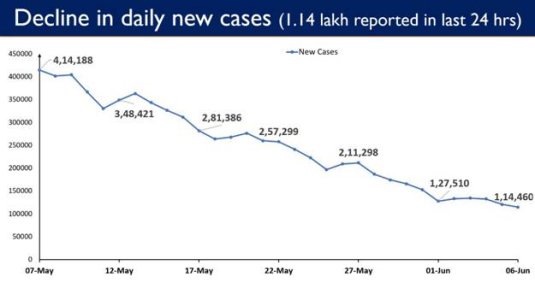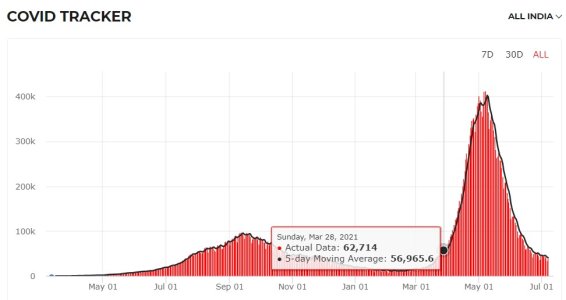Covid pandemic result of degradation of natural areas, species’ loss, exploitation: UNEP India
India has taken the path of short-term economic interest over decades and this has diminished the ability of ecosystems to provide and support both humans and other life forms, the United Nations Environment Programme (UNEP) official said while speaking to PTI.
The COVID-19 pandemic is a result of degradation of natural areas, species’ loss and exploitation, UNEP country head Atul Bagai said, underlining that countries, including India, must intensify their efforts to prevent and reverse ecosystem degradation.
He also highlighted that climate change, pollution and loss of biodiversity are three crises facing the entire planet and India, and are interconnected.
India has taken the path of short-term economic interest over decades and this has diminished the ability of ecosystems to provide and support both humans and other life forms, the United Nations Environment Programme (UNEP) official said while speaking to PTI.
“The COVID-19 pandemic is a result of the degradation of natural areas, species’ loss and exploitation. This needs to change. India is already making a concerted effort to reduce carbon dioxide emissions and be part of the global effort to reach net-zero emissions by 2050,” he said.
Read |Will scrap all projects harmful to environment if voted to power: Congress Goa in-charge
“India must intensify these efforts and participate actively in the UN Decade for Ecosystem Restoration that was launched on the World Environment Day, 2021, to prevent, halt, and reverse the degradation of ecosystems,” Bagai said.
Several actions on this front are relevant for India, which include taking policy and legislative action, raising awareness and making smart choices, he said.
“For a better future, India must work towards creating food systems that work with nature, reduce waste, and are adaptive to change and resilient to shocks. This could also take the form of halting purchases of products that are not certified as sustainable or pledging and donating for restoration initiatives,” the UNEP official said.
Bagai said that a barrier to restoration is limited awareness of negative effects of ecosystem degradation.
This can be rectified in many ways that include discussions on the value of ecosystems, campaigns that draw attention to climate change, biodiversity loss and pollution, empowering small-scale farmers and women farmers, changing patterns of consumption, challenging social norms and business practices, and capacity building and education, he said.
“We need to inculcate in India a culture that respects nature and cares for it. A healthier respect for nature will give us a healthier country and healthier people,” Bagai said.
On the role of the youth on the climate change issue, he said they are part of the larger international youth movements demanding drastic and visible action in the face of global warming and climate justice, biodiversity loss, and development at the cost of the environment.
“My best advice to young people who are concerned about environmental issues is two-fold — get informed and get involved. There is a wealth of opportunities to make a difference. Often the best place to get started is in your local community. There is much to be done, and we need everyone involved,” he added.
In recent years, he said there has been a surge in global attention on marine litter and plastic pollution.
“However, scientific knowledge on marine plastic litter and effective countermeasures remains insufficient. Keeping this in mind, the UNEP is implementing two major projects in India that focus on plastic waste management and reduction of marine plastic pollution,” Bagai said.
UNEP, with the support of the governments of Japan and Norway, is undertaking a multiyear assessment of how plastic finds its way into riverways, and ultimately the ocean through the ‘CounterMEASURE’ project and the India Norway Marine Pollution initiative.
Both projects aim to reduce marine litter and other pollutants from land-based sources and track plastic waste leakage from land into rivers.
‘CounterMEASURE’ has been working in Agra, Haridwar, Allahabad, Patna and Mumbai to address the problem of plastic waste. Technical studies have been conducted, including analysis of microplastics, macroplastics and mapping of plastic pollution hotspots in these cities and in the river Ganga, Bagai said.
The new phase of the project will look at the impact of plastic pollution on migratory species as well.
“We’ve also trained relevant stakeholders and conducted outreach for raising awareness and behaviour change. The UNEP is further supporting India by developing a national roadmap on marine plastic litter and hosting policy dialogues,” he said.
Talking about the concept of inclusive wealth, Bagai said it is a measure of the social value, not dollar price, of all its capital assets, including natural capital, human capital and produced capital.
“It can provide insights into whether current growth is sustainable or is based on over exploiting natural capital. This information can help develop policy better suited to sustaining growth while better managing human and natural capital,” he said.
On the other hand, he said the shortcomings of gross domestic product (GDP) as a measure of social well-being are now well known. GDP was introduced as an index of the size of a country’s economy — an accounting measure of all goods and services produced in a country over a given period of time, Bagai said.
“Over time, however, it began to be used not just as a measure of market activity but a measure of a country’s overall well-being. In doing so, GDP ignores the value of human capital, the non-market values of natural capital, and the economic value of environmental externalities, such as pollution,” he said.
https://indianexpress.com/article/india/covid-pandemic-result-of-degradation-of-natural-areas-species-loss-exploitation-unep-india-7367302/








